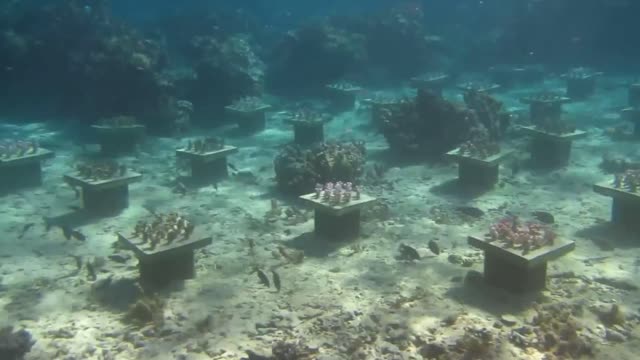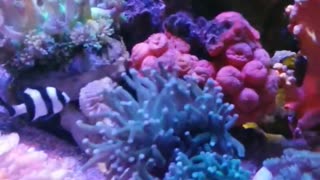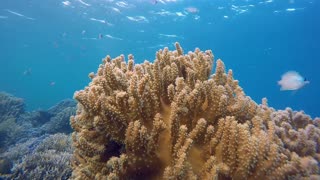Premium Only Content

Stunning Underwater Gardens Boost Coral Diversity To Stave Off Reef Destruction
These stunning underwater gardens are part of a project to save coral reefs from destruction by increasing their survivability and growth.
Although coral reefs occupy less than one percent of the world’s oceans, approximately 25 percent of marine fish species inhabit coral reefs during some part of their lives, making their protection immeasurably important to the world's ecosystems.
The United Nations Development Programme (UNDP) said around 50 percent of the world’s coral reefs has been lost in the past 20 years, and over 90 percent are expected to perish by 2050.
Two researchers at the Georgia Institute of Technology believe their project can bring hope to the increasingly grim-looking future of coral reefs.
They published their study 'Biodiversity has a positive but saturating effect on imperilled coral reefs', published in the journal Science Advances, on 13th October.
Cody Clements and Mark Hay have found that increasing coral richness by ‘outplanting’ a diverse group of coral species together improves coral growth.
The findings of the study are especially important to the early stages of a reef's recovery following large-scale coral loss.
Corals face threats on multiple fronts with overfishing and coral bleaching dealing especially heavy blows to reefs across the world.
Cody Clements said: "Yes, corals are the foundation species of these ecosystems, providing habitat and food for numerous other reef species.
"Negative effects on corals often have cascading impacts on other species that call coral reefs home. If biodiversity is important for coral performance and resilience, then a ‘biodiversity meltdown’ could exacerbate the decline of reef ecosystems that we’re observing worldwide."
Clements and Hay travelled to Mo'orea, French Polynesia, in the tropical Pacific Ocean, where they planted coral gardens made up of a diverse range of corals.
They evaluated the importance of mutualism versus competitive interactions among the coral as they grew and interacted.
Hay said: "We’ve done the manipulations, and the corals should be competing with each other, but in fact they do better together than they do on their own.
"We are still investigating the mechanisms causing this surprising result, but our experiments consistently demonstrate that the positive interactions are overwhelming negative interactions in the reef settings where we conduct these experiments.
"That means when you take species out of the system, you’re taking out some of those positive interactions, and if you take out critical ones, it may make a big difference.”
Hay said that, according to the Environmental Protection Agency (EPA), the Caribbean has lost 80 to 90 percent of its coral cover.
During the bleaching event of 2015-2016 alone, nearly half of the remaining corals along the Great Barrier Reef bleached and died.
"The frequency of these big bleaching and heating events that are killing off corals has increased fairly dramatically over the last 20 to 30 years.
"There are hotspots here and there where coral reefs are still good, but they’re small and isolated in general."
Hay and Clements manipulated the diversity of coral species in their coral gardens by planting dozens of different species on underwater 'tables' where they grow and interact with each other. The study looked at how the survivability of the coral was affected.
Studies similar to this have been carried out, says Hay, but the difference with their experiment is that it was done in the real world and not in a lab.
"We do all of our experiments in the real world. We’re not as interested in whether it can happen, but whether it does happen."
Hay said that the garden was arranged using tables and the use of Coca-Cola bottles.
He added: "We can then cut off the necks of Coke bottles, glue corals into the upside-down necks of these things, and then screw them in and out of these plots."
The corals can be removed from their 'bottles' every few months and weighed allowing the researchers to get accurate data on the growth rates.
The results showed that corals benefitted from increased biodiversity "up to a point", according to Clements.
He added: "Corals planted in gardens with an intermediate number of species, three to six species in most cases, performed better than gardens with low, or one, species, or high, as in nine, species.
"However, we still do not fully understand the processes that contributed to these observations."
Clements concluded: "We need a better mechanistic understanding of how diversity influences these processes to predict how biodiversity loss will impact corals, as well as how we may be able to harness biodiversity’s positive influence to protect corals."
Cody Clements, Georgia Tech/NF/Peter Barker
-
 2:52
2:52
Viral Tab News
1 year ago $0.02 earnedCannon Fired Across Country To Celebrate Erdogan Victory
4901 -
 0:29
0:29
The beauty of the Underwater Worlds
3 years agoUnderwater Dreams - coral reef
10 -
 1:25
1:25
Azhar4489
3 years ago $4.76 earnedUnderwater Bubble Rings towards a Reef
1.51K4 -
 0:57
0:57
Omin
3 years agoCoral reef Aquarium (3)
1411 -
 0:36
0:36
Omin
3 years agoCoral reef aquarium (2)
100 -
 0:41
0:41
Omin
3 years agoCoral reef Aquarium (1)
103 -
 0:33
0:33
AhmedGubran
4 years agobeautiful Coral Underwater
801 -
 1:07:08
1:07:08
Sean Unpaved
2 hours agoNFL Free Agency Rolls On! MLB Spring Training Heats Up along with 3x World Series Champ Dave Stewart
22.3K3 -
 2:10:15
2:10:15
Right Side Broadcasting Network
7 hours agoLIVE REPLAY: White House Press Secretary Karoline Leavitt Holds Press Briefing - 3/11/25
117K32 -
 2:06:00
2:06:00
The Quartering
6 hours agoTrump Goes NUCLEAR On Canada, Blasts Massie, Harry Potter Race Swap, Man Humiliated On TV Show
69.8K37